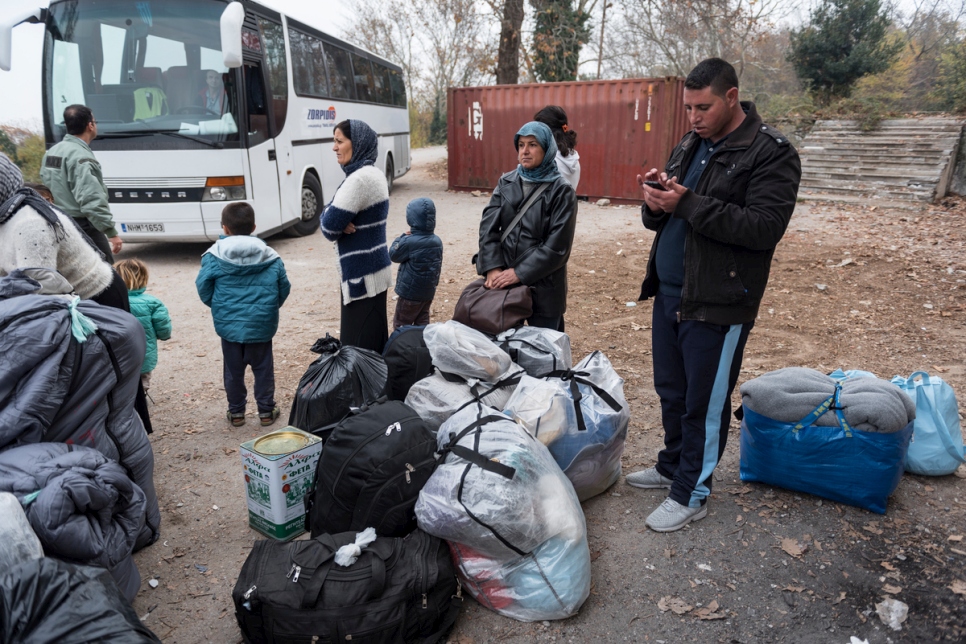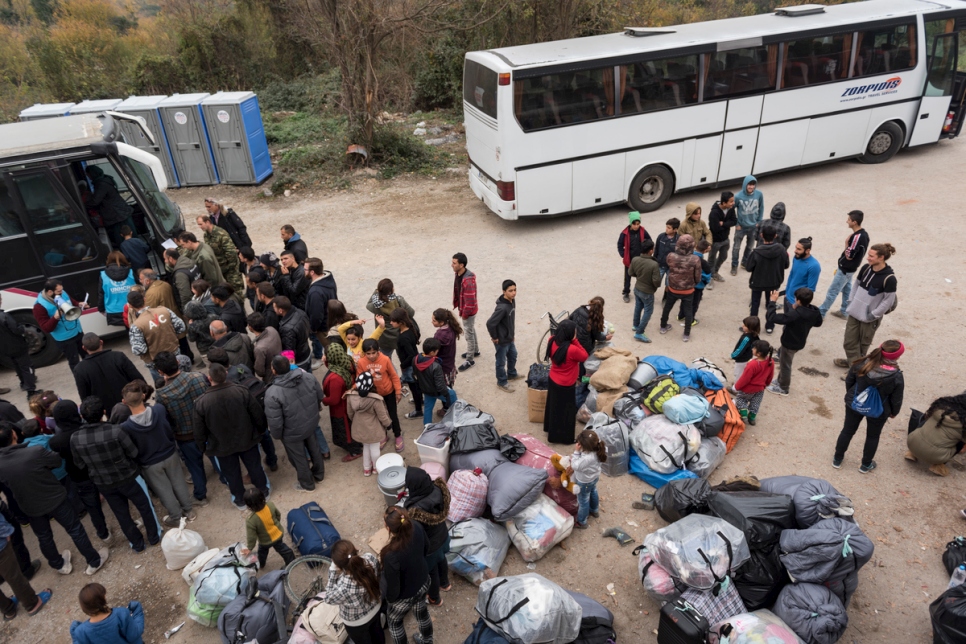UNHCR moves 1,100 out of tents, beating first snows of winter
Agency has arranged 19,500 places in apartments, hotels and with host families throughout Greece for relocation candidates and vulnerable asylum-seekers.

UNHCR staff organizing the relocation of a large Yazidi population of around 1100 people © UNHCR/Christos Tolis
ATHENS, Greece – Iraq refugee Kheri Mando Sliman, relieved to have left a freezing cold tent in a mountainside camp, seems pleased with the new accommodation provided for himself and his family in a temporary apartment in Volvi, northern Greece.
“It is a very nice, pleasant place here, not like the cold camp on Mount Olympus,” the 34-year-old, from the mountainous Sinjar region in northern Iraq, said with a smile.
He is among more than 1,100 asylum-seekers whom UNHCR, the UN Refugee Agency, moved last week from the Petra Olympou camp to buildings throughout Greece.
Since the spring, they had been living in tents at Petra Olympou on a slope more than 500 metres above sea level at the foot of Mount Olympus. In late November, temperatures fell below freezing. The last bus left the government-run site as the first snow fell on the tents.
“My four-year-old daughter could not cope any more,” said Kheri, whose family had fled violence in Iraq. His daughter was among the 54 per cent of the camp’s population who are children.
UNHCR found small, temporary apartments and hotel rooms at special rates for the asylum-seekers in Volvi, Katerini and Chalkidona. Some due to be relocated in other European countries have been accommodated in Athens to make the preparation easier.
“My four-year-old daughter could not cope any more.”
UNHCR, with funding from the European Union, has arranged 19,500 places in apartments, hotels and with host families throughout Greece for relocation candidates and vulnerable asylum-seekers.
Petra Olympou is not the only camp that UNHCR is helping the Greek authorities to close for the cold season. Kipselochori in central Greece was also deemed unsuitable for winter conditions and its former residents were moved to more appropriate accommodation. Cherso, an official refugee site in the north of the country, has been partially evacuated under the government’s direction, too.

Yazidi families packing all their belongings as UNHCR relocates them from tented site to apartments. © UNHCR/Christos Tolis
About 2,600 refugees and migrants are living in prefabricated houses provided by UNHCR in eight of more than 40 government-run sites. The UNHCR partner organization Samaritan’s Purse has been distributing winter clothes such as jackets and boots in government-run sites, about 200,000 items in total.
Kheri has been getting to know his new surroundings in Volvi. His war-torn home region of Sinjar is close to the Syrian border. A far cry from the quiet, flat landscape and lake where he now lives. Kheri is from the Yazidi religious community, which is persecuted for its faith.
“We are all right here now. We are no longer afraid.”
Daily life was never easy for his family. He earned his living by hard manual labour. Even when visiting the nearby city of Mosul, the most important urban centre in the area, at the time, he did not feel safe.
In August 2014, time ran out for Kheri and the other Yazidis in the area. With ISIS pounding the region, they fled their homes, leaving everything but their clothes behind. With his family he fled to Syria. From there they crossed into Turkey and made their way to the Greek island of Lesvos.

Yazid families waiting their turn to board a bus transferring them from tented site to apartments. © UNHCR/Christos Tolis
“By then, we had been travelling for about 14 months,” he said. In July, they arrived at Petra Olympou where they suffered from the cold climate. With a roof over his head in Volvi, he faces one less uncertainty about the future.
For some, it was a bitter-sweet goodbye on the mountain. Happy to be moving to better living conditions, nonetheless they found it a wrench to be separated from people with whom they had shared a life for many months.
Like Kheri, many had spent months on the move. With the help of the Greek authorities they were persuaded to move on to various locations rather than wait for the arrangement of one single location big enough for the entire group. “UNHCR helped us very much,” said Kheri, stressing that the Greek Government had treated him and his family well.
“We are all right here now,” he added. “We are no longer afraid."
UNHCR’s Winter Assistance Plan remains US$68 million underfunded. You can help those in need here.
